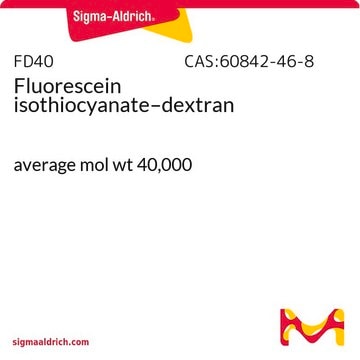FD20
Fluorescein isothiocyanate–dextran
average mol wt 20,000
Synonym(s):
FITC–Dextran
About This Item
Recommended Products
biological source
bacterial (Leuconostoc mesenteroides)
conjugate
FITC conjugate
form
powder
mol wt
average mol wt 20,000
extent of labeling
0.001-0.020 mol FITC per mol glucose
color
light yellow to dark orange
solubility
water: 25 mg/mL
storage temp.
2-8°C
Looking for similar products? Visit Product Comparison Guide
Related Categories
General description
Application
Packaging
Preparation Note
Other Notes
Signal Word
Warning
Hazard Statements
Precautionary Statements
Hazard Classifications
Eye Irrit. 2 - Skin Irrit. 2 - STOT SE 3
Target Organs
Respiratory system
Storage Class Code
11 - Combustible Solids
WGK
WGK 3
Flash Point(F)
Not applicable
Flash Point(C)
Not applicable
Personal Protective Equipment
Regulatory Listings
Regulatory Listings are mainly provided for chemical products. Only limited information can be provided here for non-chemical products. No entry means none of the components are listed. It is the user’s obligation to ensure the safe and legal use of the product.
JAN Code
FD20-BULK:
FD20-250MG:
FD20-1G:
FD20-VAR:
FD20-100MG:
Certificates of Analysis (COA)
Search for Certificates of Analysis (COA) by entering the products Lot/Batch Number. Lot and Batch Numbers can be found on a product’s label following the words ‘Lot’ or ‘Batch’.
Already Own This Product?
Find documentation for the products that you have recently purchased in the Document Library.
Customers Also Viewed
Articles
Explore FITC-labelled polysaccharides and their properties, including impact of molecular weight on molecule dimensions.
Related Content
Dextran is a polymer of anhydroglucose. It is composed of approximately 95% alpha-D-(166) linkages. The remaining (163) linkages account for the branching of dextran.
Our team of scientists has experience in all areas of research including Life Science, Material Science, Chemical Synthesis, Chromatography, Analytical and many others.
Contact Technical Service








